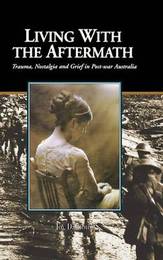
|
Living with the Aftermath: Trauma, Nostalgia and Grief in Post-War Australia
Hardback
Main Details
| Title |
Living with the Aftermath: Trauma, Nostalgia and Grief in Post-War Australia
|
| Authors and Contributors |
By (author) Joy Damousi
|
| Physical Properties |
| Format:Hardback | | Pages:250 | | Dimensions(mm): Height 229,Width 152 |
|
| Category/Genre | Australia, New Zealand & Pacific history |
|---|
| ISBN/Barcode |
9780521802185
|
| Classifications | Dewey:994.05 |
|---|
| Audience | | Professional & Vocational | | General | |
|---|
| Illustrations |
8 Halftones, unspecified
|
|
Publishing Details |
| Publisher |
Cambridge University Press
|
| Imprint |
Cambridge University Press
|
| Publication Date |
2 April 2001 |
| Publication Country |
United Kingdom
|
Description
This very moving book on the shifting patterns of mourning and grief focuses on the experiences of Australian women who lost their husbands during the Second World War and the wars in Korea and Vietnam. The book makes use of extensive oral testimonies to illustrate how widows internalised and absorbed the traumas of their husband's war experience. Joy Damousi is able to demonstrate that a significant shift in attitudes towards grieving and loss came about between the mid century and the later part of the twentieth century. In charting the memory of grief and its expression, she discerns a move away from the denial and silence which shaped attitudes in the 1950s towards a much fuller expression of grief and mourning and perhaps a new way of understanding death and loss at the beginning of the new century.
Reviews"A valuable addition to the literature on Australian war, society and culture, like many good books, Living With the Aftermath raises as many questions as it answers." Pacific Affairs "Damousi has opened up a rewarding field of inquiry." International History Review "Damousi's book certainly succeeds in its aim 'to correct the absence of war widows from Australian history' (p. 8), and it does far more. This is a most enjoyable book that should appeal to general readers as well as specialists." American Historical Review
|